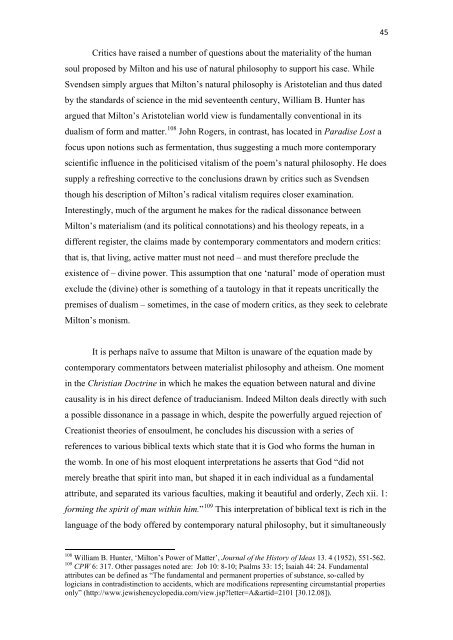Medical Science and the Anatomia Animata in Milton's Paradise Lost
Medical Science and the Anatomia Animata in Milton's Paradise Lost
Medical Science and the Anatomia Animata in Milton's Paradise Lost
Create successful ePaper yourself
Turn your PDF publications into a flip-book with our unique Google optimized e-Paper software.
Critics have raised a number of questions about <strong>the</strong> materiality of <strong>the</strong> human<br />
soul proposed by Milton <strong>and</strong> his use of natural philosophy to support his case. While<br />
Svendsen simply argues that Milton’s natural philosophy is Aristotelian <strong>and</strong> thus dated<br />
by <strong>the</strong> st<strong>and</strong>ards of science <strong>in</strong> <strong>the</strong> mid seventeenth century, William B. Hunter has<br />
argued that Milton’s Aristotelian world view is fundamentally conventional <strong>in</strong> its<br />
dualism of form <strong>and</strong> matter. 108<br />
John Rogers, <strong>in</strong> contrast, has located <strong>in</strong> <strong>Paradise</strong> <strong>Lost</strong> a<br />
focus upon notions such as fermentation, thus suggest<strong>in</strong>g a much more contemporary<br />
scientific <strong>in</strong>fluence <strong>in</strong> <strong>the</strong> politicised vitalism of <strong>the</strong> poem’s natural philosophy. He does<br />
supply a refresh<strong>in</strong>g corrective to <strong>the</strong> conclusions drawn by critics such as Svendsen<br />
though his description of Milton’s radical vitalism requires closer exam<strong>in</strong>ation.<br />
Interest<strong>in</strong>gly, much of <strong>the</strong> argument he makes for <strong>the</strong> radical dissonance between<br />
Milton’s materialism (<strong>and</strong> its political connotations) <strong>and</strong> his <strong>the</strong>ology repeats, <strong>in</strong> a<br />
different register, <strong>the</strong> claims made by contemporary commentators <strong>and</strong> modern critics:<br />
that is, that liv<strong>in</strong>g, active matter must not need – <strong>and</strong> must <strong>the</strong>refore preclude <strong>the</strong><br />
existence of – div<strong>in</strong>e power. This assumption that one ‘natural’ mode of operation must<br />
exclude <strong>the</strong> (div<strong>in</strong>e) o<strong>the</strong>r is someth<strong>in</strong>g of a tautology <strong>in</strong> that it repeats uncritically <strong>the</strong><br />
premises of dualism – sometimes, <strong>in</strong> <strong>the</strong> case of modern critics, as <strong>the</strong>y seek to celebrate<br />
Milton’s monism.<br />
It is perhaps naïve to assume that Milton is unaware of <strong>the</strong> equation made by<br />
contemporary commentators between materialist philosophy <strong>and</strong> a<strong>the</strong>ism. One moment<br />
<strong>in</strong> <strong>the</strong> Christian Doctr<strong>in</strong>e <strong>in</strong> which he makes <strong>the</strong> equation between natural <strong>and</strong> div<strong>in</strong>e<br />
causality is <strong>in</strong> his direct defence of traducianism. Indeed Milton deals directly with such<br />
a possible dissonance <strong>in</strong> a passage <strong>in</strong> which, despite <strong>the</strong> powerfully argued rejection of<br />
Creationist <strong>the</strong>ories of ensoulment, he concludes his discussion with a series of<br />
references to various biblical texts which state that it is God who forms <strong>the</strong> human <strong>in</strong><br />
<strong>the</strong> womb. In one of his most eloquent <strong>in</strong>terpretations he asserts that God “did not<br />
merely brea<strong>the</strong> that spirit <strong>in</strong>to man, but shaped it <strong>in</strong> each <strong>in</strong>dividual as a fundamental<br />
attribute, <strong>and</strong> separated its various faculties, mak<strong>in</strong>g it beautiful <strong>and</strong> orderly, Zech xii. 1:<br />
form<strong>in</strong>g <strong>the</strong> spirit of man with<strong>in</strong> him.” 109<br />
This <strong>in</strong>terpretation of biblical text is rich <strong>in</strong> <strong>the</strong><br />
language of <strong>the</strong> body offered by contemporary natural philosophy, but it simultaneously<br />
108<br />
William B. Hunter, ‘Milton’s Power of Matter’, Journal of <strong>the</strong> History of Ideas 13. 4 (1952), 551-562.<br />
109<br />
CPW 6: 317. O<strong>the</strong>r passages noted are: Job 10: 8-10; Psalms 33: 15; Isaiah 44: 24. Fundamental<br />
attributes can be def<strong>in</strong>ed as “The fundamental <strong>and</strong> permanent properties of substance, so-called by<br />
logicians <strong>in</strong> contradist<strong>in</strong>ction to accidents, which are modifications represent<strong>in</strong>g circumstantial properties<br />
only” (http://www.jewishencyclopedia.com/view.jsp?letter=A&artid=2101 [30.12.08]).<br />
45
















